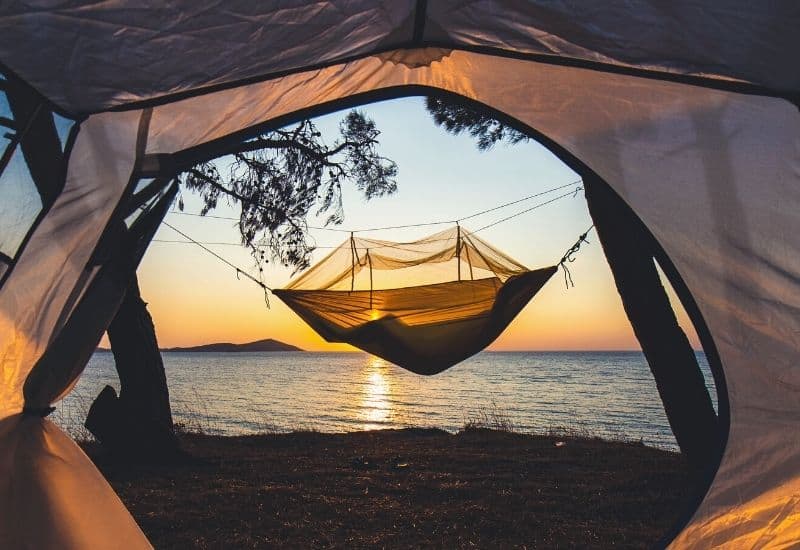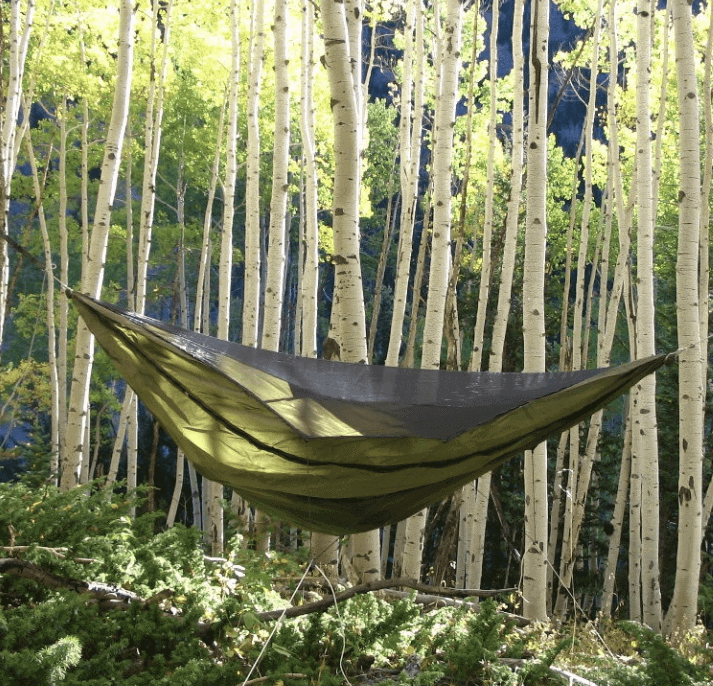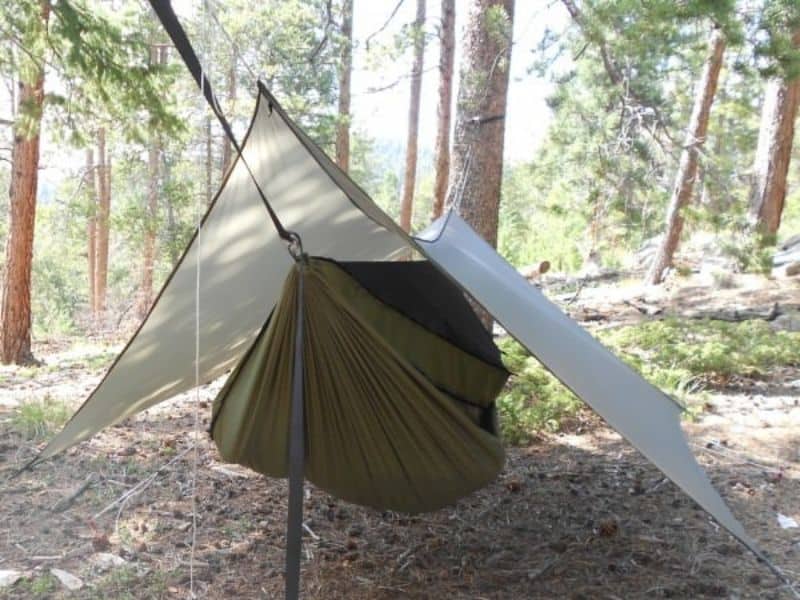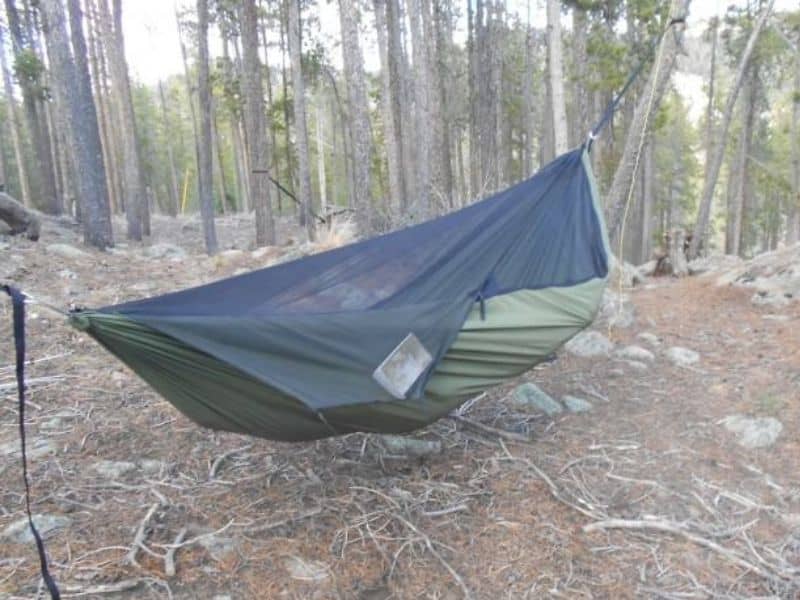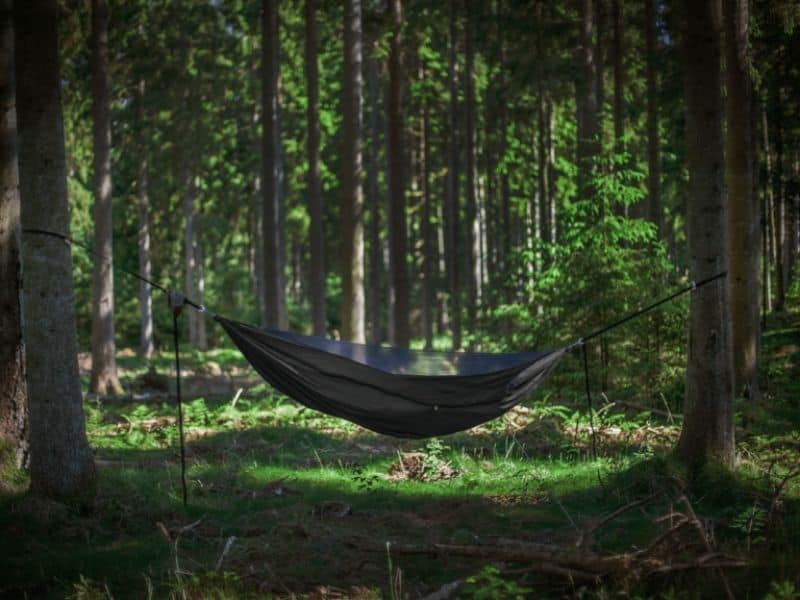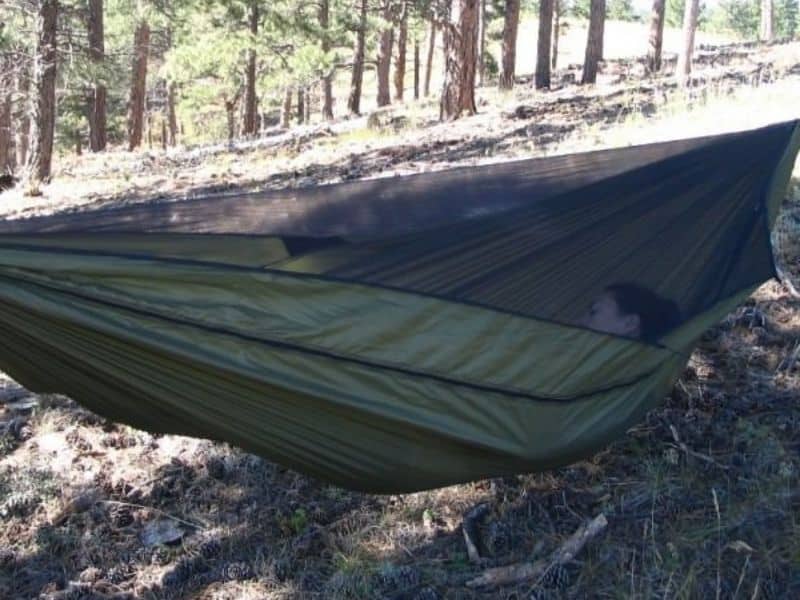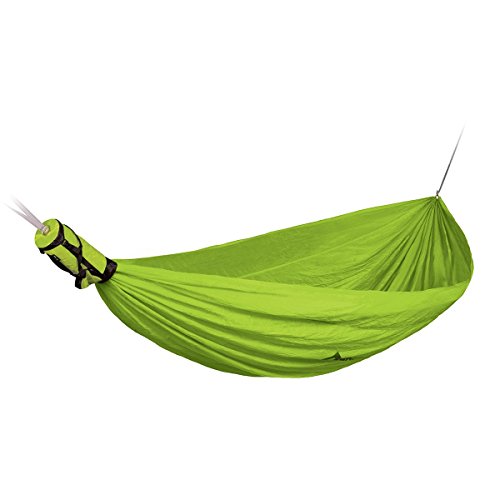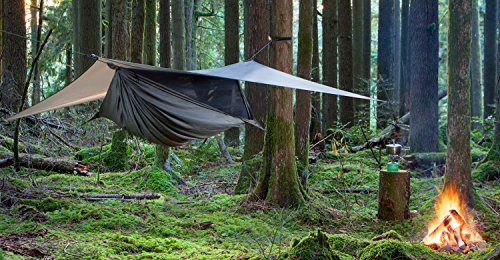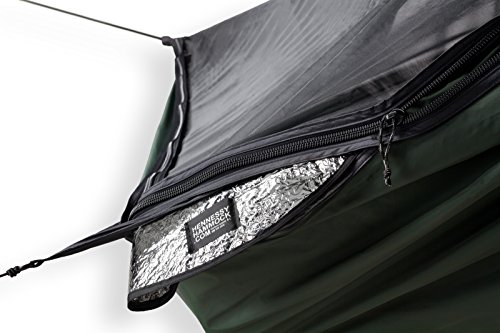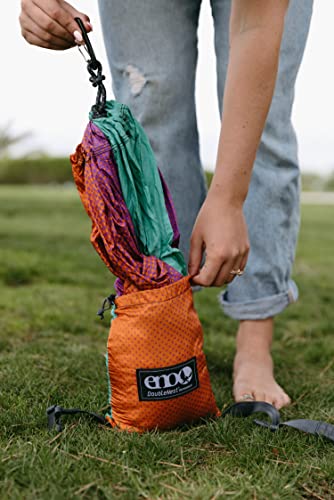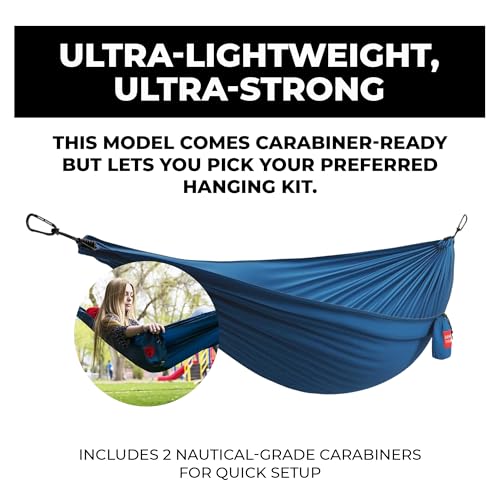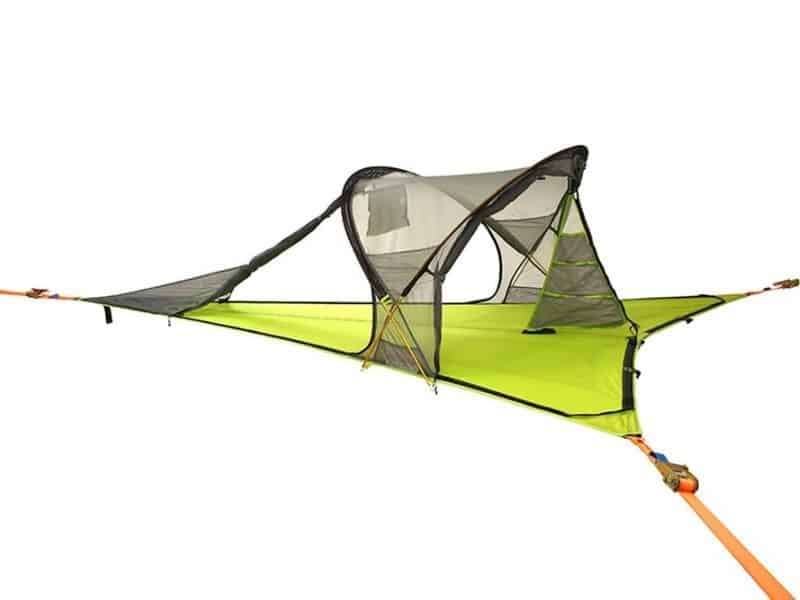In recent years, the popularity of hammock camping has soared. To avid hammock enthusiasts, this comes as no surprise. Hammocks offer a lighter, more compact, and for many, a more comfortable alternative to the traditional sleeping pad, bag, and tent combination.
Whether you plan on using your hammock for thru-hiking, car camping, or lounging in the yard, our guide has you covered. It includes reviews of eleven outstanding hammocks, explains why we picked Warbonnet Blackbird as our favorite, and if you’re not sure which is best for you, our detailed buying advice is there to lend a hand.
Do
Don’t
Table of Contents
Quick Recommendations
-
Editor’s Choice:
Warbonnet Blackbird
“A hard-wearing, reliable, and superbly comfortable model that ticks every box.” -
Best Value:
Sea to Summit Double Pro
“Ideal for ultralight backpacking couples.” -
Best for Car Camping:
Hennessy Hammock Expedition Asym
“An all-weather hammock system that comes with an integrated bug net and rainfly.” -
Best Double Hammock:
ENO Doublenest
“The DoubleNest offers the best value of all the two-person hammocks we tested.” -
Best Budget:
Grand Trunk Ultralight
“With a load capacity of 300lbs and weighing just 12 oz, the GTU is one of the best camping hammocks out there for gram counters or occasional hammockers.” -
Best for Backpacking:
Hummingbird Single Camping Hammock
“Not the most spacious option out there, but it weighs a tiny 5.2 oz and holds up to 300 lbs.” -
Best Capacity:
Kammok Roo Double
“An extra-roomy two-person model with a load capacity of 500 lbs.” -
Best for Comfort:
ENO Skyloft
“A luxury option that scores highly in every metric aside from packed weight and price.” -
Best Hammock Tent:
Tentsile Connect 2-Person
“A darned pricey but outstandingly practical, user-friendly hammock tent that’s ideal for hammockers looking to up their game.”
Which is the best camping hammock?
From lounging hammocks in our yard to taking a backpacking hammock on the trail, we’ve tested dozens of models and selected the following 11 hammocks as our favorites.
- Warbonnet Blackbird
- Sea to Summit Double Pro
- Hennessy Hammock Expedition Asym
- ENO Doublenest
- Grand Trunk Ultralight
- Hummingbird Single Camping Hammock
- Kammok Roo Double
- ENO Skyloft
- Tentsile Connect 2-Person
Warbonnet Blackbird
Editor’s Choice
Weight: 15.75 lbs. (without suspension) ⸱ Weight Capacity: 350 lbs. ⸱ Dimensions: 120” x 62”
The Warbonnet Blackbird scoops our award for best camping hammock thanks to its outstanding comfort, generous dimensions, impressive weight capacity, and tough materials.
Cottage brand Warbonnet versus all the big names in the hammocking niche is comparable to David versus Goliath. And, just as in the biblical tale, this David also comes up trumps. The Blackbird does everything both beginner and seasoned hammockers need a hammock to do…and a little more to boot.
This hammock measures a generous 10 feet long by 62 inches wide and has an outstanding weight capacity of 350 lbs. This makes it suitable for sleepers up to 6’2” tall and one of few single-person hammocks that can accommodate people who pip the 300-pound mark. Despite this, the hammock itself weighs in at a modest 15.7 oz. (sans suspension), so is a decent option for backpacking.
Let’s talk bells and whistles, of which the Blackbird has a few…
First up, there’s a roomy, built-in foot box that lets you shift around a little without ensnaring your feet. Secondly, there’s a “noseeum” bug net top that unzips fully on one side and folds up when not in use. Thirdly, there’s a storage shelf that provides a secure but out-of-the-way compartment for your bedtime essentials.
While there’s already a lot to love about this hammock, our testers particularly admired the Dream-Tex fabric. This combines 40D ripstop nylon with a bias-directional diamond grid pattern to provide superior strength and a far softer, cozier next-to-skin feel than other nylons, making it a true standout in the comfort stakes.
The Blackbird is also available in several colors and in both a two-person size or with a single or double-layer (which boosts load capacity).
PROs
- 40D ripstop nylon Dream-Tex fabric
- Handy added features (footbox and shelf)
- High weight capacity
- Lightweight
- Zippered, integrated bug netting with elastic guylines to keep net away from your face
CONs
- Bug net not detachable
- Pricey
Bottom-Line: A great option for mid-hike hangs, camping, backpacking, and hammock camping newbies and veterans alike.
Sea To Summit Double Pro
Best Value
Weight: 23.6 oz (with included straps, buckles, and stuff sack) ⸱ Weight Capacity: 400 lbs. ⸱ Dimensions:118 x 75 inches
The Sea to Summit name is virtually synonymous with high-quality, dialed-in outdoor kit, and the Double Pro hammock demonstrates why.
The Double Pro hammock system is made with 70D ripstop nylon fabric, making it the toughest and most durable hammock on our list. While this fabric’s a little less soft against the skin compared to most hammocks on our list, our testers feel the S2S DP is a shoo-in for buyers who value longevity over all else.
Compared with the other two-person camping hammocks on our list, the ENO DoubleNest and Kammok Roo, the S2S DP is a little roomier, measuring 118” x 75” to the DoubleNest’s 115” x 74” and Roo’s 120” x 68.5”.
And while the DoubleNest is the cheaper of the two, it’s worth bearing in mind that it’s sold without a suspension system, while the DP comes with suspension straps and quick-connect buckles.
PROs
- Room enough for two!
- High weight capacity
- Suspension straps and buckles included
- Tough, 70D ripstop nylon fabric
- Water-resistant stuff sack
CONs
- Quite heavy
- Fabric isn’t the softest
Bottom-Line: A tough, roomy, lightweight hammock that comes with everything hammocking couples need to get their hang on!
Hennessy Hammock Expedition Asym
Best For Car Camping
Weight: 47 oz. (including suspension) ⸱ Weight Capacity: 250 lbs. ⸱ Dimensions: 100 x 48 inches
The Hennessy Expedition Asym is the best camping hammock out there is you’re looking for a complete hammock shelter system that includes everything you need for all-weather adventuring.
This is the second most expensive hammock on our list, after the Warbonnet Blackbird, but you get a lot of bang for your buck.
For starters, there’s the extra-long, extra-wide 70D nylon hammock itself, which uses an asymmetrical design that allows you to lay flatter than in many hammocks.
Next, there’s a 30D polyester No-See-Um bug net that can be clipped back for night-sky views whenever the biters aren’t on the rampage.
Thirdly, the Asym comes with a complete suspension system, including 10 ft., low-stretch polyester core ropes with polyester webbing suspension straps.
To top it all off, there’s a 70d, PU-coated polyester ripstop rainfly, which impressed in testing in rainy conditions.
At 47 oz., this camp hammock setup is heavy. In return for those extra ounces, however, you get an ultra-durable camping hammock that’s built to withstand not only the elements but years of use and abuse.
If you like the look of the Hennessy Expedition but want something a little lighter, check out the Hennessy Ultralite Backpacker Asym Zip. This isn’t quite as rugged as the Expedition, and has a lower weight capacity, but weighs in at 15 oz. lighter.
PROs
- Patented asymmetrical design for a lay-flat hammock no matter how you sleep
- Long enough to accommodate users up to 6’ tall
- User-friendly suspension system and bug net included
- Gear pocket slides on the ridgeline
- Folds into an open-air lounger or can be deployed as a tent when paired with your hiking poles
- Complete hammock shelter system
CONs
- Heavy
- Expensive compared to most other camping hammocks
- Overkill for occasional users
Bottom-Line: A beast of a hammock that comes with everything you need to hang out in buggy conditions and wet weather.
ENO Doublenest
Best Double Hammock
Weight: 19 oz (35 oz with suspension system) ⸱ Weight Capacity: 400 lbs. ⸱ Dimensions: 112 x 74 inches
The Eno DoubleNest has been one of the top-selling hammocks on the market for the best part of a decade. And there are plenty of reasons why this one’s won the approval of so many happy hammockers – it’s comfortable, robust, and roomy enough for two.
The DoubleNest doesn’t boast much in the way of bells and whistles but covers its bottom line impressively. It’s made with 70D nylon taffeta with triple-lock stitching for added strength, which makes it one of the most durable and robust camping hammocks in our review, after the Sea to Summit Double Pro, ENO Skyloft, and Hummingbird Single.
Measuring 112 by 74 inches, it’s also one of the roomiest. And with a weight capacity of 400 pounds, it’s second only to the Kammok Roo Double.
Our testers also found the Doublenest is easy to hang thanks to its use of (included) carabiners that can be clipped into (not included) daisy chain suspension straps for simple adjustment. We also like that it’s available in multiple color schemes.
And the downsides? Well, given that the Doublenest weighs 35 oz. with suspension, it isn’t the lightest option by a long way. And having to buy your tree straps separately detracts somewhat from its apparent affordability.
PROs
- High weight capacity
- Roomy enough for two (palatial for one!)
- Highly durable fabric
- Affordable
- Carabiners included
CONs
- A little too heavy for backpacking
- Suspension system sold separately
Bottom-Line: A solid, reliable hammock that’s big enough for two and ideal for front-country hammock camping.
Grand Trunk Ultralight
Best Budget
Weight: 12 oz. ⸱ Weight Capacity: 300 lbs. ⸱ Dimensions: 114 x 54 inches
The Grand Trunk Ultralight is a great budget hammock and the ideal pick if you’re new to the hammock camping game and looking to test the water before splurging on a pricier kit.
The GTU lacks the fancy design features found on pricier hammocks, but it does what the occasional hammocker needs it to do. It’s durable, spacious, easy to use, and we found it comfortable to hang in during testing. Given that it retails at around half the price of big-name competitors, that’s not bad for starters.
The GTU is made with parachute nylon fabric. This isn’t as comfortable as the fabric used in the Warbonnet Blackbird or Eno DoubleNest, but is highly durable and triple-stitched at all weight-bearing points for added security. It also has a weight capacity of 300 lbs. and measures 114” x 54”, making it capable of accommodating tall and large sleepers.
Tree straps aren’t included with this GTU hammock, but it comes with 2 nautical-grade carabiners and a confidence-inspiring lifetime warranty.
Looking for something similar but a little more robust? Check out the Grand Trunk Skeeter Beeter Pro here.
PROs
- Cheap!
- Generous weight capacity
- Large dimensions
- Lifetime warranty
CONs
- Straps not included
- A little too heavy for backpacking
Bottom-Line: A frill-free but functional and reliable cheap hammock that does everything the occasional hammocker needs their hammock to do.
Hummingbird Single Camping Hammock
Best For Backpacking
Weight: 5.2 oz. (just the hammock) ⸱ Weight Capacity: 300 lbs. ⸱ Dimensions: 104 x 47 inches
The Hummingbird Single’s tiny weight makes it the best ultralight hammock available for hikers and backpackers looking to shave off every possible ounce.
This featherweight camping hammock weighs a tiny 5.2 oz. This makes it the lightest hammock we tested by a large margin and more than three times lighter than the winner of our review, the Warbonnet Blackbird.
Despite its light weight, the Hummingbird scores highly in nearly every metric. It’s made with tough, ripstop nylon fabric (built to FAA parachute rigging standards, no less), has a weight capacity of 300 lbs, and can be easily set up when paired with the Hummingbird Ultralight Tree Straps.
The only downside is that it measures just 104”x47”, which some of our testers felt a little narrow and short. This, however, will only be an issue if you’re over 6’ tall. And if you’d prefer a roomier version, check out the Hummingbird Single+, which is only 2 oz. heavier but measures 116” x 63”.
PROs
- Ultralight – the ideal travel hammock or hiking hammock
- High weight capacity
- Tiny packed size
- Ripstop nylon fabric
CONs
- Stingy dimensions
- Straps not included
Bottom-Line: An ultralight but slightly undersized camping hammock that’s best suited to users under 6’ tall or keen to shave ounces off their pack weight.
Kammok Roo Double
Best Capacity
Weight: 17 oz.(34 oz. with straps) ⸱ Weight Capacity: 500 lbs. ⸱ Dimensions: 120 x 68.5 inches
The Kammock Roo doesn’t only have the best capacity of all the camping hammocks we tested, it’s also one of the most comfortable we’ve ever slept in.
The Roo is made with silky, durable, 40-denier Gravitas diamond ripstop nylon. This isn’t only tough, but feels awesome against your skin and uses a fade-resistant UV inhibitor treatment that ensures the color stays bright season after season.
We also love the attention to detail on this hammock. Kammok uses a proprietary crinkle treatment that breaks the fabric in and ensures ‘from-the-box’ softness and easy packability from the get-go. And if you opt for the suspension system, you’ll get a pair of patented carabiners capable of supporting 5,000 lb of force and Dyneema Racer Slings that are 15 times stronger than steel.
So, why isn’t the Kammok Roo outselling competitors like the ENO Doublenest or Sea to Summit Double Pro? With the DoubleNest, we can only imagine this is down to ENO’s sparkling reputation, or the fact that the Roo’s a little on the narrow side by comparison. The S2S DP, on the other hand, is a whole 10 oz. lighter (with straps), so is favored by weight weenies.
PROs
- High weight capacity
- Straps and water-resistant stuff sack included
- Fade-resistant, breathable, and fast-drying fabric
- 8 integrated gear loops
- Lifetime warranty
- Good stuff sack
CONs
- Relatively narrow for a two-person hammock
Bottom-Line: A very well-made two-person nest that’s uber-comfortable and ideal for heavier users.
ENO Skyloft
Best For Comfort
Weight: 45.8 oz. ⸱ Weight Capacity: 250 lbs. ⸱ Dimensions: 4.5 x 18.5 inches
Our testers unanimously voted The Eno Skyloft the most comfortable camping hammock owing to its space-enhancing design, soft fabric, and adjustability for different sleeping styles.
The Skyloft is the most luxurious hammock we tested. It uses a semi-circular design that cradles the body and thanks to its aluminum spreader bars provides a flatter lay than regular-shaped camping hammocks. The spreader bars not only give you a larger sleeping area but make it one of few camping hammocks in which front sleepers can sleep comfortably.
The Skyloft is also two hammocks in one. This unique camping hammock has two ‘modes’ – sleep and relax. In sleep mode, you get a flatter lay for catching Zs. In relax mode – achieved with a simple tug on the tensioners at one end – your ‘bed’ converts into a lounger that’s ideal for taking in the views or reading a book.
All this, however, comes at a price, both in $ and packed weight, as the Skyloft is both the priciest and the heaviest rainfly-free camping hammock on our list.
PROs
- Oh-so comfortable
- Truly flat lay hammock
- Easy setup
- Durable material
- Spreader bars make it roomier than gathered-end hammocks
- Functional stuff sack
CONs
- Pricey
- Heavy
- Suspension system isn’t included
Bottom-Line: A heavy but exceptionally comfortable luxury camping hammock that’s ideal for hammock camping from the car or days near the beach or lake.
Tentsile Connect 2-Person
Best Hammock Tent
Weight: 20 lbs. 12.8 oz. ⸱ Weight Capacity: 880 lbs. ⸱ Dimensions: 136 x 106 x 36 in.
The Tentsile Connect has long been recognized as one of the best hammock tents out there. It’s remarkably well-made, fully waterproof, roomy, versatile, and boasts a few non-standard features that set it apart from almost any other tent hammock system we know.
The Tentsile is billed as a 2-person hammock tent, but with a floor area of 52 square feet, center height of 3 feet, and load capacity of 880 lbs., it can comfortably accommodate two adult sleepers and a kid. The tent can also be joined to one or two other Connects to create either a 4 or 6-person tent.
While the setup is tricky, time-consuming, and requires 3 trees, the Tentsile is super-convenient once “pitched.” It has a total of 4 doors for easy entry/exit, a wealth of underfloor and interior storage compartments, and even a hanging tablet pouch for watching movies. And if you can’t find 3 trees, it can always be deployed as a regular ground tent.
Compared to a regular hammock-fly-bug net shelter system, the TC has the benefit of providing a lot more room, a lot more stability, a hell of a lot more storage, and far superior weather protection courtesy of its 5,000mm HH rainfly.
And compared to a regular tent? Well, you can stay down there with the dirt and critters and lumpy sleeping surface if you want, but if cloud-like comfort sounds like something you might want to try, the Tentsile Connect will deliver.
PROs
- Outstanding weight capacity
- Plenty of storage pockets
- Can be used as a regular tent
- Full bug protection
- Waterproof rainfly (5,000 HH)
CONs
- Expensive (even for a hammock tent)
- (Really) heavy!
- Setup is tricky and time-consuming
- Three trees/anchors required
Bottom-Line: An incredibly well-designed hammock tent that’s a good option for buyers who want next-level comfort and weather protection…and have $ to burn.
Hammock Comparison Table
| Product Name | Type | Weight Capacity | Dimensions | Packed Weight |
|---|---|---|---|---|
| Warbonnet Blackbird | Camping Hammock | 350 lbs. | 120” x 62” | 15.75 lbs. |
| Sea to Summit Double Pro | Double Hammock | 400 lbs. | 118" x 75" | 23.6 oz. |
| Hennessy Hammock Expedition Asym | Hammock Shelter | 250 lbs. | 100" x 48" | 47 oz. |
| ENO Doublenest | Double Hammock | 400 lbs. | 112" x 74" | 19 oz. (35 oz. with suspension system) |
| Grand Trunk Ultralight | Camping Hammock | 300 lbs. | 114" x 54" | 12 oz. |
| Hummingbird Single Hammock | Backpacking Hammock | 300 lbs. | 104" x 47" | 5.2 oz. |
| Kammok Roo Double | Double Hammock | 500 lbs. | 120" x 68.5" | 17 oz. (34 oz. with straps) |
| ENO Skyloft | Camping Hammock | 250 lbs. | 4.5" x 18.5" | 45.8 oz. |
| Tentsile Connect 2-Person | Hammock Tent | 880 lbs. | 136" x 106" x 36" | 20 lbs. 12.8 oz. |
Top Choices By Category
Backpacking: Hummingbird Single Camping Hammock and Warbonnet Blackbird
Camping/Yard: ENO Skyloft, Hennessy Hammock Expedition Asym, and Tentsile Connect 2-Person
Comfort: ENO Skyloft and Warbonnet Blackbird
Highest Weight Capacity: Kammok Roo Double and Sea to Summit Double Pro
Lightest: Hummingbird Single Camping Hammock
How to choose a hammock for camping or backpacking?
To help you choose the perfect hammock for your needs, we provide a detailed explanation of all the factors to consider when buying.
- Type & Versatility
- Comfort & Support
- Weight Capacity
- Size & Weight
- Suspension System
- Durability
- Weather Resistance
Type & Versatility
The type of hammock you choose impacts how versatile it is and how suitable it will be for different types of adventures.
The choices available are single hammocks, double hammocks, and tent hammocks.
Design-wise, single and double hammocks are all but identical. With double, two-person hammocks, you simply get more space to accommodate a second sleeper and higher-tenacity materials that can handle a heavier load.
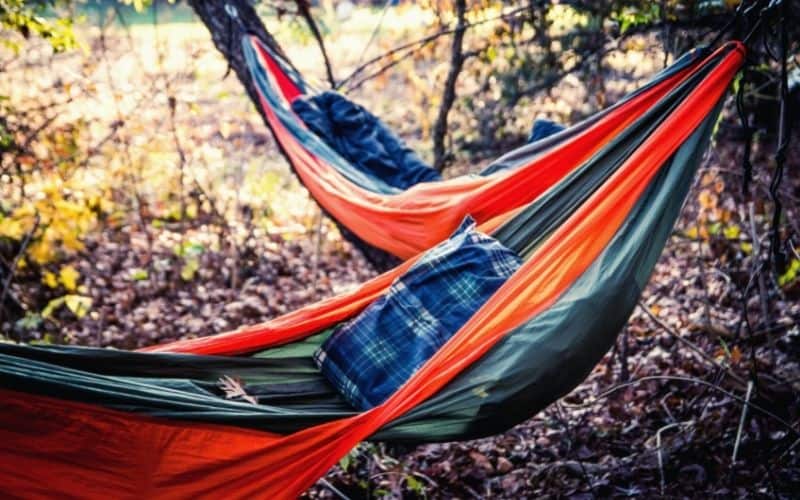
As with single models, check the load capacity and ensure the hammock is at least two feet longer than the height of the tallest sleeper.
Looking for more room? We recommend a model like the ENO Skyloft, which uses spreader bars that essentially expand the fabric at both ends to create a more rectangular shape, thus providing a wider sleeping area than with a gathered-end hammock, which tapers inward at the top and tail.
Many backpackers prefer hammocks over traditional sleep systems because lightweight or an ultralight hammock like the Hummingbird Single will allow them to shed a few ounces from their total pack weight, even if this means compromising on durability and spaciousness.
If you’re a car camper, however, you can afford to throw weight considerations to the wind. In this case, heavier-duty and roomier hammocks like the ENO DoubleNest, ENO Skyloft, or Tentsile Connect become an option.
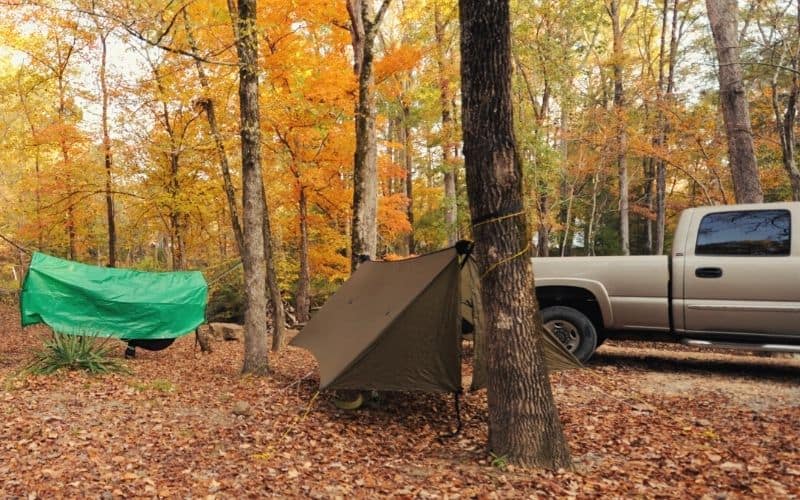
Comfort & Support
Comfort and support are two of the most important factors to consider when choosing a camping hammock. Ideally, you want a model that lets you lie in a relatively flat position, provides ample headroom, and enough space to stretch out.
Ideally, you should be able to lie diagonally. This provides a flatter sleeping surface and helps avoid uncomfortable curvature of the spine and neck. For this, you’ll need a model that’s a minimum of two feet longer than your height, and at least 45 inches wide (48 if you’re over 6’ tall).
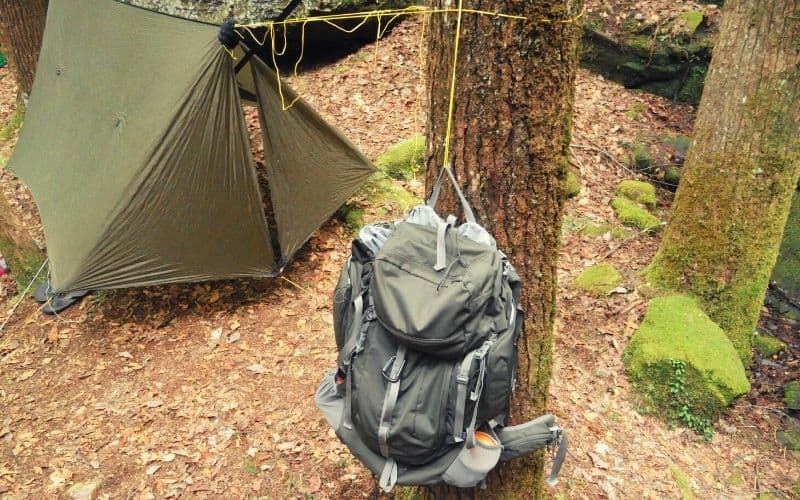
If you’re a larger human, the dimensions and/or max load capacity of a single hammock might not cut the mustard (read: support your weight or accommodate your physique). In this case, a two-person model like the ENO DoubleNest or Kammok Roo Double will prove more comfortable (and be less likely to collapse while you’re catching your Zs!).
Weight Capacity
Weight capacity is another vital consideration when choosing a hammock.
The hammocks in our review have weight capacities ranging from 250 pounds (the Hennessy Hammock Expedition Asym) to 500 pounds (the Kammok Roo Double).
While choosing a suitable model simply comes down to matching the hammock with how much weight you plan on putting in there, there are a few observations worth making.
First up, make sure you account for ALL of the weight you plan on putting in there. That means your body weight plus the weight of your quilt or sleeping bag, plus the weight of your clothes/pajamas/canine/cat/teddy bear.
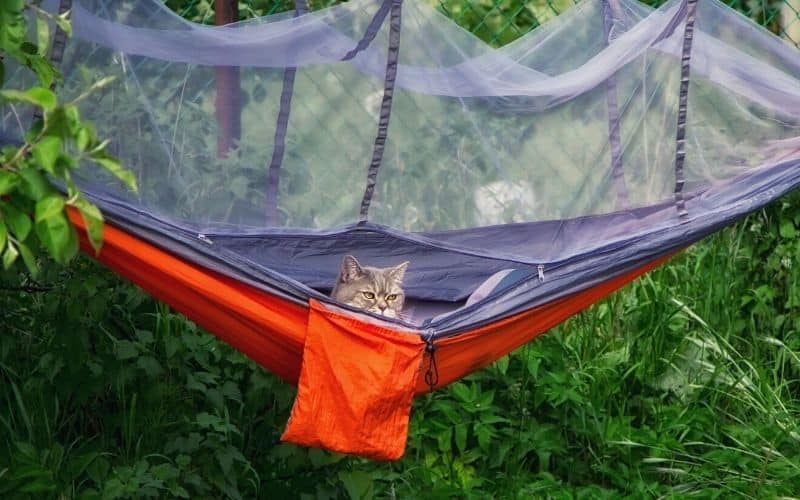
Secondly, be sure to leave a 10-20 pound buffer over and above the total weight calculated above. This is not only an act of “due diligence,” but will allow you to pile on a few pounds without having to fork out for a new “hang.”
Size & Weight
The size and weight of your is a key consideration if you’re backpacking but less so if car camping.
Heavier models tend to offer more comfort than their lighter counterparts courtesy of using thicker materials and having more spacious dimensions, which makes them more conducive to a satisfying snooze.
When backpacking, however, every ounce counts, so getting as much fabric per ounce of packed weight is often the name of the game, as long as this doesn’t mean compromising on durability.
The lightest hammock on our list? Take a bow, the Hummingbird Single. The HS isn’t only ultralight, but is made with tough, ripstop nylon fabric and has an impressive 300-pound load capacity.
The heaviest? The Hennessy Expedition Asym (47 oz.), though it’s worth noting that this comes with an integrated bug net, rain fly, and suspension system. The heaviest without suspension and other accessories is the ENO Skyloft, which weighs a whopping 45.8 oz.
Suspension System
A hammock suspension system another important factor to take into account when choosing your hammock. The suspension system is simply the method used to tie and secure your hammock to a tree or stand. These are typically made up of nylon, polyester, or Dyneema straps and carabiners, though a few exceptions do exist.
Not all hammocks include a suspension system, so be sure to factor this in when weighing up the options to ensure you get value for money.
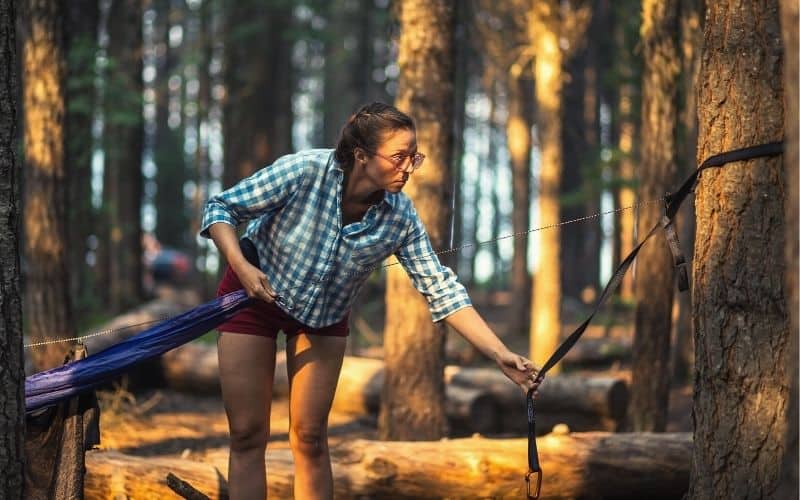
On our list, the ENO Doublenest, Grand Trunk Ultralight, and Warbonnet Blackbird’s suspension systems are sold separately.
Most hammocks can work with different types of suspension system. However, many hammock brands sell proprietary suspension systems that are specific to their brand or even certain models, like the ENO Helios or ENO Sublink.
The type of suspension system you use might not seem like a big deal, but it can make a world of difference to setup time and general convenience.
Daisy-chain straps are both user-friendly and convenient, so are the best hammock straps out there for beginners. To use them, all you have to do is loop one end of the strap around your anchor point, feed it through the loop of webbing on one end, then clip the strap to the end of your hammock with your ‘biner.
To help you get the ideal 30º hang angle, daisy chain straps have multiple connection points (the links in the “chain”) per strap. This saves you from having to mess around with knots and makes tweaking your tensioning a breeze.
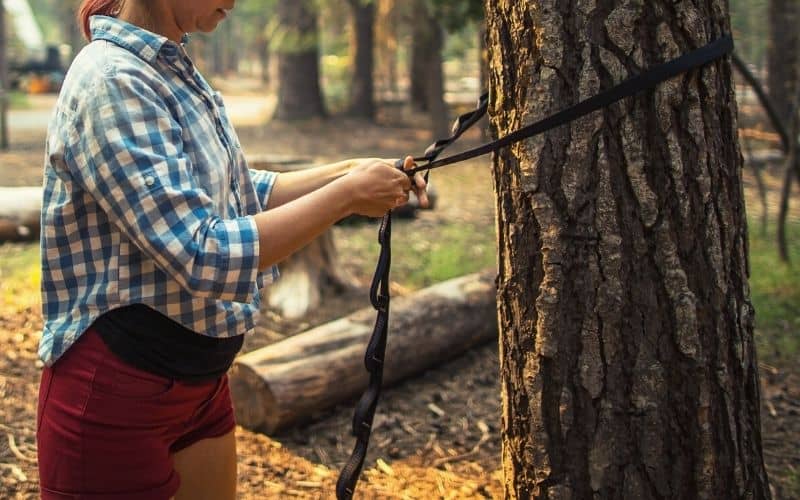
The only real downside to daisy chains is that they tend to be much heavier than other types of straps. If you’re hammocking in wet weather, water can also run down the strap and into your sleeping area if the flat side of the strap is turned skyward.
Our favorite chain straps for our hammock shelter system? The ENO Atlas.
Here’s how to use a daisy chain:
Whoopie slings are a popular suspension system among backpackers because they’re lightweight, packable, and easily adjustable.
Whoopies comprise a fairly easy-to-use loop and knot system. While they have a lower load capacity and aren’t as easy to set up as a daisy chain, they’re easy to adjust and far lighter.
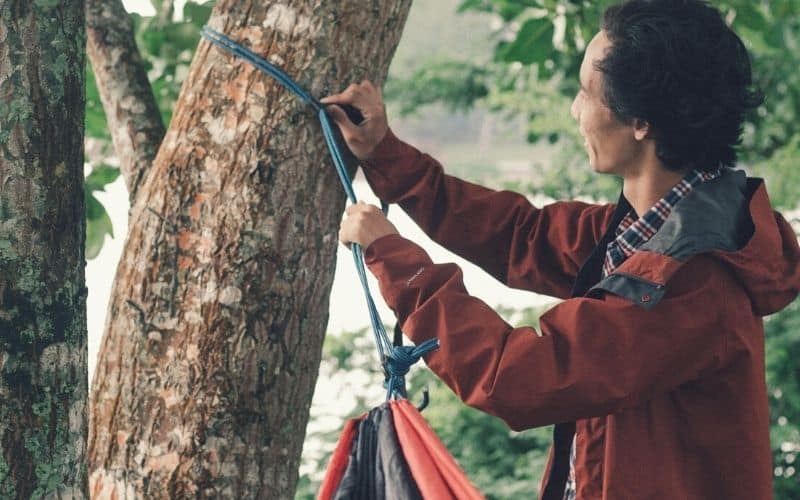
Our favorite whoopie? The Hanging High Whoopie Sling.
Here’s how a whoopie sling is used:
Buckle suspension systems are ultralight and easy to set up but not as common as the other two suspension types. On the plus side, buckle systems usually require no knots and are easily adjusted. On the downside, they typically don’t hold as much weight as daisy chains.
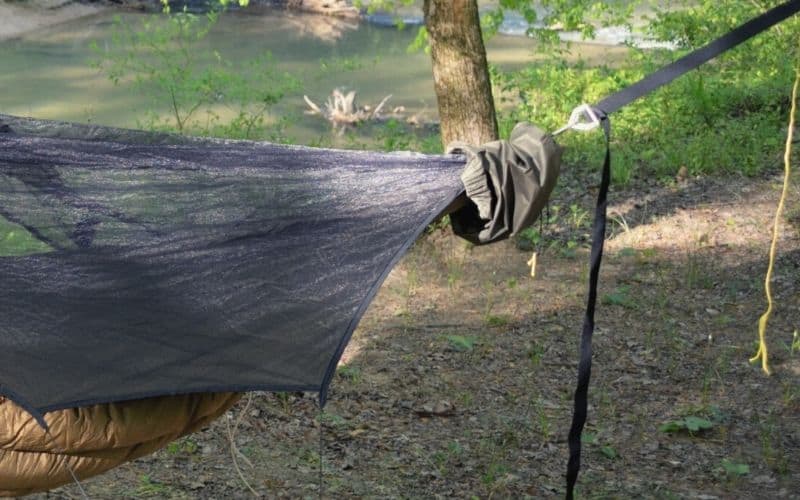
Our favorite? The Warbonnet Outdoors Buckle Suspension System.
Here’s how they’re used:
Durability
Durability is key to getting value for money in any camping product, and the same applies when choosing a camping hammock. In this case, it can make the difference between hanging happily ever after or an unhappy nocturnal landing somewhere down the line.
But how do you gauge durability?
This all depends on the type of fabric and the fabric denier rating.
Let’s start with the denier rating. This refers to the thickness of the fibers in the fabric and is usually represented by a number followed by a solitary ‘D’, i.e. 20D, 70D, etc. The higher the denier rating, the thicker the diameter of the yarn. And the thicker the diameter of the yarn, the more durable and abrasion-resistant the fabric will be.

The Eno Skyloft, which is made with 140D ripstop nylon, is by far the toughest hammock on our list. This is followed by the Sea to Summit Double Pro, Hennessy Expedition Asym, and ENO Doublenest, which are all made with 70D nylon. The Kammok Roo Double and Warbonnet Blackbird (both 40D) have the lowest denier rating.
The other indicator of durability is the type of fabric used. Most models use either nylon, ripstop nylon, parachute silk, or polyester.
Polyester
Polyester is easy to care for. It doesn’t absorb much water, so it’s very resistant to mold and dries quickly after getting wet. This makes it a good choice if you’ll be leaving it exposed to the elements.
There are, however, a few downsides to polyester. For starters, it’s oleophilic. This means it absorbs oil, including – you guessed it – the oil from your skin. Over time, therefore, polyester camping hammocks may get a bit stinky, less breathable, and the colors might begin to fade. Polyester also isn’t as tough as nylon, so it’s not the best bet for backcountry adventuring.
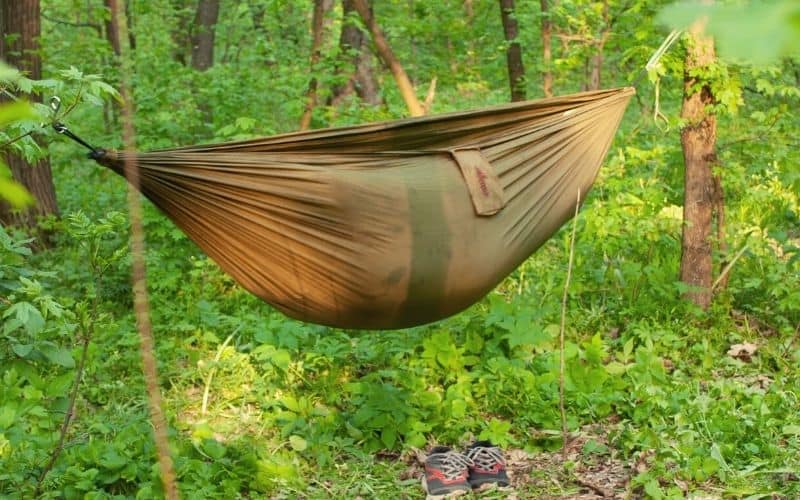
Nylon
Nylon is the most popular material used in bona fide camping or backpacking hammocks (as opposed to yard or beach hammocks). The reasons for this are simple. It’s durable, lightweight, relatively breathable, and more rip-resistant than other fabrics.
The only real downsides to nylon are that it absorbs more water than polyester (and so takes longer to dry out), and is typically pricier than other fabrics.
Ripstop Nylon
Nylon-made fabrics are often reinforced using a special weaving technique that earns them the designation “ripstop.” This technique involves weaving additional fibers through the original fibers to add strength and create resistance to rips and tears. Ripstop fabrics are easily distinguished by the diamond pattern of the weave.
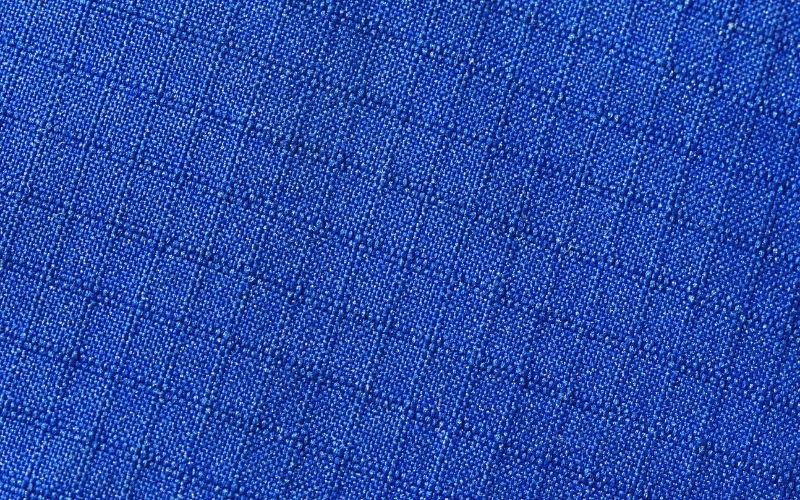
On our list, the following hammocks are made with ripstop nylon: Sea to Summit Pro Hammock, ENO Skyloft, and Hummingbird Single.
Parachute Silk
This is a variety of nylon that’s made with extra-thin threads and is especially soft to the touch. It weighs less and dries quicker than standard nylon, so it’s a good choice for backcountry hammockers. The only hammock on our list made with parachute nylon is the Grand Trunk Ultralight, winner of our best budget hammock award.
Need extra strength? If so, you might want to consider a double-layer hammock. As the name suggests, double-layer hammocks are those that use two layers of fabric instead of one. While this adds to the weight, it increases load capacity and rip resistance. Although there are no double-layer hammocks on our list, the Warbonnet Blackbird is available in a two-layer version.
Weather Resistance
Weather resistance is an important metric to consider if you plan on hammock camping in anything worse than perfect conditions.
When buying your hammock it’s wise to factor in the added cost and weight involved in adding a rain fly to your setup. Some of the camping hammocks on our list might seem like bargains at first, but once you’ve added the cost of a fly, this might no longer be the case.
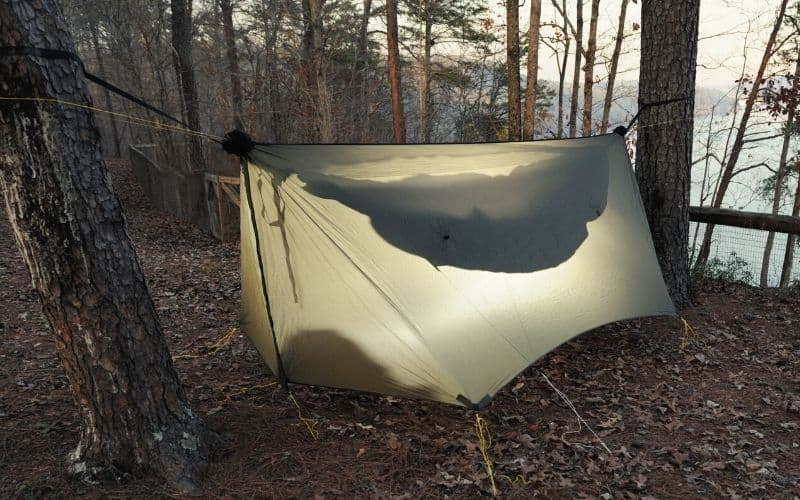
Some of the pricier options, likewise, might suddenly seem like a good deal when you discover they include a full suspension system and a rain fly, as is the case with the Hennessy Expedition Asym.
All of the above, of course, depends on the conditions in which you tend to do your hammocking. In our experience, though, having a rainfly along for any overnight trip is never a bad thing, just in case conditions take a turn for the worse.
What is hammock camping?
Hammock camping is sleeping outdoors overnight with a sleep system comprising a hammock plus a quilt or sleeping bag. Most hammockers also use hammock tarps for weather protection.
How to hang a hammock?
To hang your hammock, find two sturdy trees roughly 12 feet apart. Girth hitch a strap around each tree and connect these to the ends of your hammock with carabiners. Next, adjust the tension in your straps until your hammock hangs roughly 18-20 inches from the ground when loaded.
How to wash a hammock?
To wash your hammock, start by removing all straps and carabiners. Place it in the washing machine on a gentle cycle and use a mild detergent. To protect the fabric, you can place the hammock inside a pillow cover or laundry bag while washing.
Best Hammock Camping Accessories
Below, we provide examples of our favorite hammock camping accessories, including straps, tarps, bug nets, underquilts, sleeping pads, sleeping pads, and hammock stands.
Hammock Straps
Our favorite hammock straps are the Kammok Python 10. These straps are lightweight, durable, easy to adjust, and have a 500 lb weight capacity. For a lighter alternative, we recommend the ENO Helios, which weigh a tiny 4.3oz but can support up to 300lbs.
Rain Tarp
The best rain tarp for hammocks is the Kammok Kuhli Tarp, which combines generous coverage with awesome waterproofing to make it the perfect pick. For more options, check out our guide to the best hammock tarp or opt for a model like the HH Expedition Asym, which has a rainfly included.
Other brands sell rain flys separately, as with the S2S Profly Rain Tarp and the ENO Sublink Shelter System.
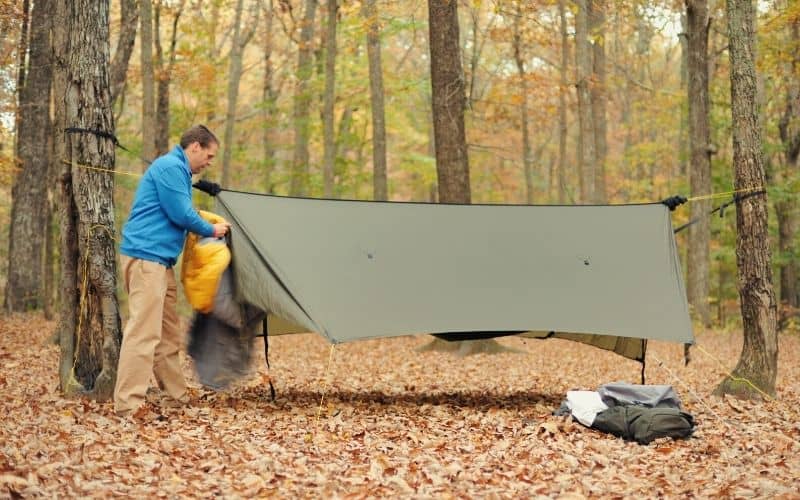
Unsure how to hang a tarp? No problem! All is explained in our step-by-step guide on hammocking tarp setup.
Bug Net
The best hammock bug net is the Kammok Dragonfly, which our testers found to be the most effective net they trialed and is also impressively lightweight and compact. It’s also large enough to cover even the biggest hammocks, and hangs from a ridgeline to prevent sagging. For other options, check out our guide to the best hammock bug net.
While bug nets might be deemed indispensable for hammocking in buggy locations, we feel that integrated models are less versatile than the detachable kind. The reason? In short, a detachable bug net can be discarded in bug-free locations, saving you a little pack space and weight. An integrated bug net, however, is there for good times and bad, for better or worse…
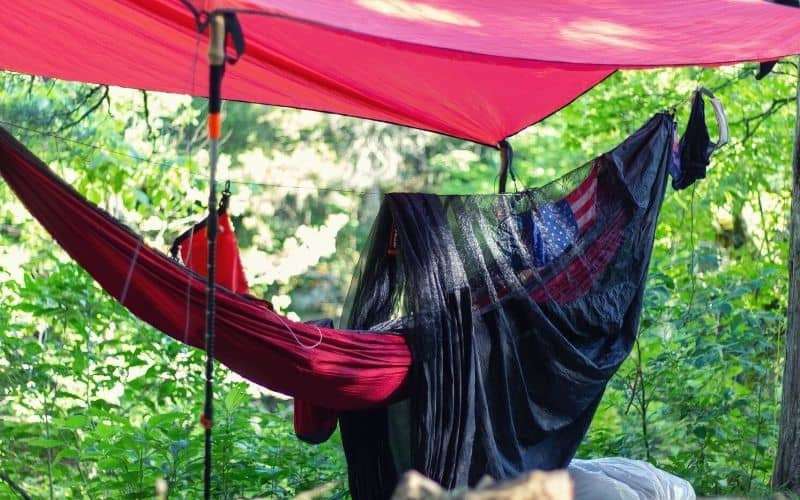
Underquilt
Our favorite underquilts for hammocking are the Enlightened Equipment Revolt or ENO Blaze. For more on these and other options, check out our comprehensive guide to the best underquilts.
Many newbie hammockers wonder why underside insulation is necessary. Our bodies, after all, aren’t in contact with the cold ground, as is the case when tent camping. And we have our sleeping bag, too…
The problem lies in the fact that sleeping bags rely on ‘loft’ for insulation. When compressed against the fabric of our hammocks by the weight of our body our sleeping bag’s loft is all but nullified, leaving our undersides exposed to cold air.
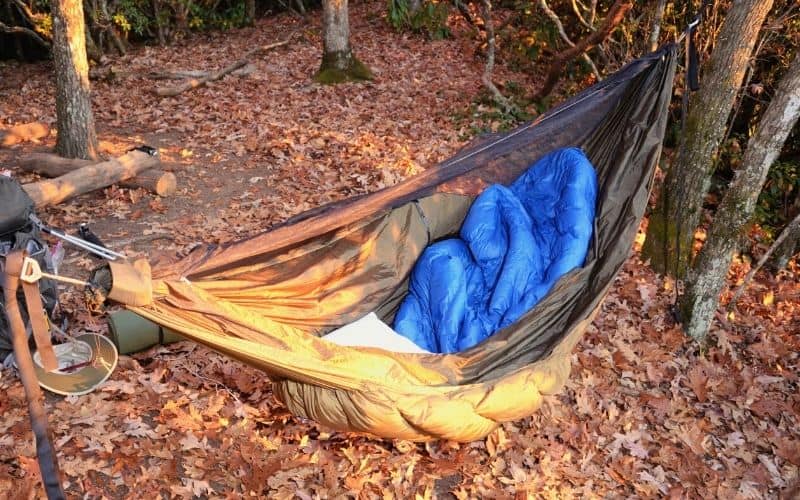
Underquilts are designed to attach to the underside of hammocks, thus creating a layer of insulation that won’t be compressed by your body weight. With a good underquilt, winter camping or backpacking adventures in your hammock become doable in the lower 48. They are, however, invariably pricey.
Sleeping Bag
The best sleeping bag for hammock camping is the Feathered Friends Hummingbird 20F. This bag is lightweight, packable, and warm enough for three-season hammock camping.
Sleeping Pad
Our favorite sleeping pad for hammock camping is the Klymit V, which provides ample insulation for most three-season adventures and confrms better than most to the curvature of a hammock.
Hammocking Stand
Our favorite hammock stands are the Kammok Swiftlet and the ENO SoloPod Stand. For a more affordable option, check out the Sunnydaze Portable Stand.
Hammocking stands are a handy way to ensure you can hang your hammock no matter where you take it. While way too heavy and unwieldy for backcountry camping or backpacking, for car camping, beach hammocking, or garden hacks, they’re frickin’ ideal.
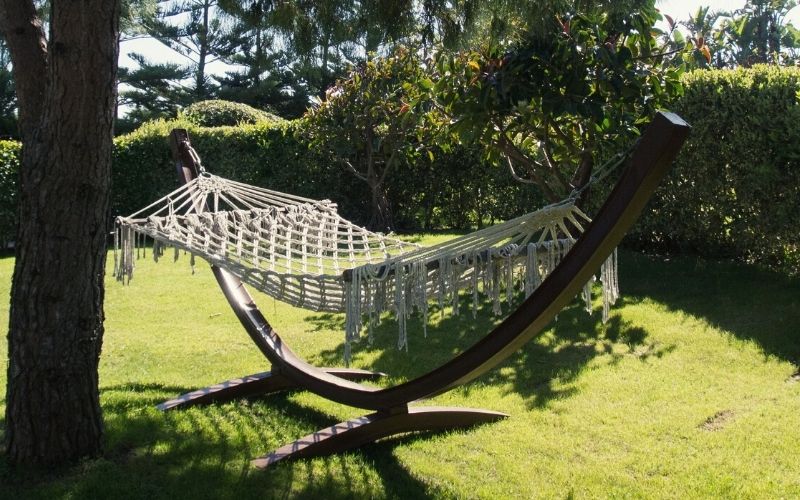
Best Backpacking Hammocks: The Verdict
Hammock camping is a great way to take your camping game to, literally, a whole new level…but only, of course, if you have the right hammock camping gear. We hope the above article has helped you pin down what the “right” kinda kit looks like and steered you in the direction of the perfect camping hammock for your needs.
The best all-rounder? The tough, tried, and true Warbonnet Blackbird.
The best for occasional hammockers? The affordable but fully functional Grand Trunk Ultralight.
And the best for buyers who want the most luxurious hammock sleeping experience? The Eno Skyloft, whose spreader bars and soft fabric allow it to deliver cloud-like comfort.
So, how did you like our article? If you have any questions, please leave a comment in the box below. And if you’d like to share this post with your friends, share away!
